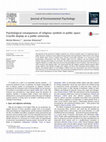Papers by Jarosław Klebaniuk
Nierówności społeczne a wzrost gospodarczy, 2016

The question of the presence of religious symbols (e.g. crosses) in public space is an important ... more The question of the presence of religious symbols (e.g. crosses) in public space is an important topic in public discourse, leading to many political disagreements and legal disputes. What seems to be missing in the debate about crosses in public space (schools, universities, hospitals) is an assessment of the psychological consequences that these symbols might have for religious and non-religious people visiting, studying and working in such places. The present experimental study examined the influence of religious displays in a public university room on the psychological state of students: their self-esteem, as well as positive and negative affect. The study found that the religious symbol reduced negative affect among students who identify strongly with religion and those who frequently attend religious ceremonies. The negative effects on non-religious students were less pronounced. This result is discussed with reference to self-affirmation theory, environmental psychological theories and more recent findings on the social consequences of more subtle religious exposures. Ó 2013 Elsevier Ltd. All rights reserved. "A crucifix on a wall is an essentially passive symbol (.) It cannot be deemed to have an influence on pupils comparable to that of didactic speech or participation in religious activities," pronounced the European Court of Human Rights on the presence of crucifixes in classrooms of state schools (ECHR, 2011, p. 29). This sentence was preceded by a large debate about the presence of religious symbols in European public schools. Such debates are linked also to a more general question about the impact of religious symbols present in living space on people's well-being and psychological functioning.
Journal of Environmental Psychology, 2013

Journal of Environmental Psychology, 2013
The question of the presence of religious symbols (e.g. crosses) in public space is an important ... more The question of the presence of religious symbols (e.g. crosses) in public space is an important topic in public discourse, leading to many political disagreements and legal disputes. What seems to be missing in the debate about crosses in public space (schools, universities, hospitals) is an assessment of the psychological consequences that these symbols might have for religious and non-religious people visiting, studying and working in such places. The present experimental study examined the influence of religious displays in a public university room on the psychological state of students: their self-esteem, as well as positive and negative affect. The study found that the religious symbol reduced negative affect among students who identify strongly with religion and those who frequently attend religious ceremonies. The negative effects on non-religious students were less pronounced. This result is discussed with reference to self-affirmation theory, environmental psychological theories and more recent findings on the social consequences of more subtle religious exposures.
Nierówności społeczne a wzrost gospodarczy, 2016











Uploads
Papers by Jarosław Klebaniuk